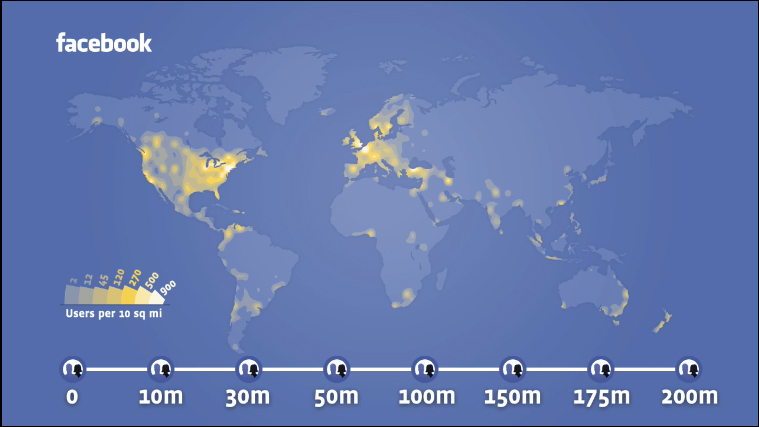Facebook's 200 million users show it has a long way to go

Two hundred million. Kind of an amazing number, isn't it?
That's the number of users Facebook reached yesterday, and the company's proud of it, as evidenced by CEO Mark Zuckerberg's beaming missive, "200 million strong."
"It took 20,000 years for the world population to get to 200 million people," an accompanying video proclaims. "It would take 46.5 years for 200 million babies to be born in the U.S.," it adds.
Impressive stuff, to be sure.
But when fellow ZDNet blogger Zack Whittaker blogged about the topic yesterday -- specifically about how powerful the site, no, service, is -- he questioned the company's next move, asking, "So what is the next step for Facebook?"
He writes:
The problem is, is that I don’t know. I cannot foresee anything for the near future that Facebook could possibly do which could make any more of a difference than it already has done. The site already allows ordinary users to make decisions as a democracy as to how any major changes should be played, and after turning five year old only a couple of months ago, have they already done all they can do?
To which I respond, plenty. Because while 200 million is an incredible, impressive, amazing figure for such a young company, it just shows that Facebook has many, many, many more people to reach, much less offer new services to its existing user base.
There are approximately 6.7 billion people living on this planet, and about 23.8 percent of them have Internet access, or roughly 1.6 billion people. This shows incredible growth from 2000 -- 342 percent growth, actually -- when you compare to the year 2000, when about 361 million people had Internet access.
Since then, computers have gotten cheaper and more portable, phones have become computers, and the Internet has exploded in every dimension. And big, important entities are looking to increase that 23.8 percent any way they can.
Let's go back to 2003, when Facebook began as Zuckerberg's baby project at Harvard. I first signed up to Facebook in early 2004, when it was restricted to just a few colleges. Since then, it's well-known that Facebook has moved beyond education and the workplace to account for real people all over the globe, and it's been amazing to watch from within the site. Facebook's expansion is seemingly limited only by how quickly it can roll out new translations and buy up server racks.
Now, back to those numbers. Even comparing Facebook's current global saturation with year 2000 numbers for worldwide Internet access -- when the company didn't exist -- Facebook only has covered about 55 percent of that user base. But that's not a realistic comparison.
So let's make a fair comparison. Using the current number for people who Internet access in the world -- about 1.6 billion people -- Facebook has only covered 12.5 percent of that population. In other words, 87.5 percent, or about 1.4 billion, of Internet-connected people are not on Facebook. That's a whole lot of people who theoretically could access Facebook's site and sign up.
And that's not even including the 5.1 billion people who aren't on the Internet at all.
Now, everyone likes to make a stink about how fast Twitter is growing as compared to Facebook. But not everyone in the world needs or wants to Twitter, whereas Facebook has the "directory of real people" asset that other sites do not. It's arguably the most important part of Facebook -- the fact that each person has one account and it's actually them.
So let's look at growth data.
Using comScore data, Facebook grew 89 percent in the time it went from a closed site it was to the open directory it is, from May 2006 to May 2007. Again, impressive.
But the world is gaining Internet access at a fast pace, too: 342 percent from 2000-2008, with more than 1,000 percent growth in Africa (the second most populous world region behind Asia) and the Middle East (which is somewhere between half and two-thirds the population of North America).
Those numbers aren't directly comparable, since the Facebook's growth figure is over a single year and the world figure is over more years than Facebook has been in existence. But the point I'm attempting to illustrate is this: Facebook may be growing rapidly, but the world's Internet access is, too. Not only must Facebook chase Internet-connected users it hasn't yet reached, but it must keep pace with a world coming online.
That's a whole heck of a lot of people that aren't yet on Facebook.
Will everyone with Internet access sign up for Facebook? Of course not. But if the company sticks to its "real person directory" core, it has something that's not only useful for Facebook's own monetization, but also for individual users seeking others. And if the world keeps signing on at such a rapid clip -- after all, there is immense utility in having such a far-reaching directory that its users willingly update themselves -- it should be Facebook's goal to get 'em while they're young, at least with regard to the age of their Internet exposure.
Facebook could make itself an essential, ubiquitous part of the Internet, much in the same way Google has attempted to do with its services, or Microsoft has done with regard to computers. Need to get someone's address or telephone number? Facebook can be the new white or yellow pages of the world. Need to find family members? Facebook can strike a deal with Ancestry.com. Need to find a journalist or press contact? Cision would be left in the dust. Looking for an easy way to contact your elected representative? Same deal, all while Facebook quietly expands into new and underserved markets, peddling Facebook profiles and the connective power they hold.
And then 200 million would look like a drop in the bucket.
